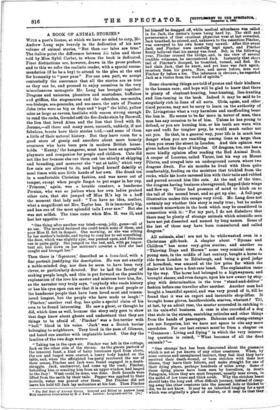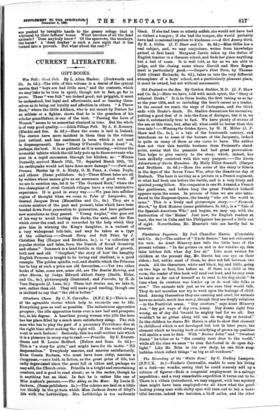A BOOK OF ANIMAL STORIES.* WITH a poet's license, at
which we have no mind to carp, Mr. Andrew Lang says bravely in the dedication of his new volume of animal stories, "But then our tales are true."
The italics point the difference between his tales and those told by Miss Sybil Corbet, to whom the book is dedicated.
Finer distinctions are, however, drawn in the prose preface, and to this we refer the realistic reader, with a special recom- mendation (if he be a boy) to attend to the plea at the end for humanity to "poor puss." For our own part, we accept contentedly the assurance that all the stories are as true as they can be, and proceed to enjoy ourselves in the very miscellaneous menagerie Mr. Lang has brought together. Dragons and unicorns, phomixes and mastodons, buffaloes arid griffins, the stegosaurus and the odenthos, sea-monks, sea-bishops, sea-peacocks, and sea-asses, the ants of Prester John (who were as big as dogs and "kept" the hills), yellow mice as large as ravens, basilisks with venom strong enough to rend the rocks, Grendel add the fire-drake slain by Beowulf, the lion that loved Aissa and the lion that lived with St.
Jerome,—all these and many more, uncouth, unlikely, if not fabulous, beasts have their stories told,—and some of them a little of their natural history. But they leave room for a good store of gossip and anecdote about more homely creatures who have been pets in modern British house- holds. ' Kanny,' the kangaroo, must have been an agreeable playmate and companion for people and children. Cats did not like her because she cut them out loo utterly at skipping and bounding, and moreover she "sat at table,' which very few cats are allowed to do, and helped herself daintily at meal times with nice little hands of her own. She drank tea
in a comfortable Christian fashion, and was never out of temper, except when people forgot to put sugar in her cup. Princess,' again, was a lovable creature, a handsome Persian, who was so jealous when her own ladies praised other cats, that she jumped off Miss H.'s lap in a huff the moment that lady said : "You have no idea, mother, what a magnificent cat Mrs. Taylor has. It is immensely big, and has one of the most splendid tails I ever saw." But she was not selfish. The time came when Mrs. H. was ill, and lost her appetite :—
" One thing after another was tried—soup, jelly, game—all of no use. The invalid declared she could touch none of them, and poor Miss H. felt in despair. One morning, as she was sitting by her mother's bedside, and trying to coax her to eat something, the door, which was slightly .ajar, was pushed open, and Princess ran in quite gaily. She jumped on the bed, and, with 1.n impor- tant air, laid down on her mistress's coverlet a bird she had caught and brought her."
Then there is Squoncer,' described as a beau.laitl, with a
fine portrait justifying the description. He was not exactly a noble-minded dog, nor does he seem to have been very clever, or particularly devoted. Bat he }sad the faculty of making people laugh, and this is put forward as the possible explanation of the love his master and mistress bore him, for, as the narrator very truly says, anybody who reads history or has his eyes open can see that it is not the good people or the handsome people that have been loved most and remem- bered longest, but the people who have made us laugh!" ' Pincher,' another real dog, has quite a special claim of his own to be found interesting. He saw a ghost, or thought he did, which does as well, because the story only goes to show that dogs know about ghosts and understand that they are things to be afraid of. Pincher' was a fox-terrier with " bull " blood in his veins. 'Jack' was a Scotch terrier belonging to neighbours. They lived in the pass of Glencoe, ind hated one another with implacable hatred. One day the families of the two dogs were-
" Taking tea in the open air. Pincher was left in the cottage, Jack on the other side of the stream. As the guests partook of the innocent feast, a kind of hairy hurricane sped from above, the urn and teapot were overset, a heavy body landed on the table, and, when the affrighted tea-party recovered the use of their senses, Pincher and Jack were found engaged in a death- struggle. Jack, unobserved, had come up the road; Pincher, beholding him or scenting him from an upper window, had leaped to the fray ! What could be done, was done. • Both hounds were lifted from the earth by their tails. Pepper was applied to their nostrils, water was poured over them. But Pincher did not leave his hold till Jack lay motionless at his feet. Then Pincher The Red Boo?: of Animal Stories. Selected and Edited by Andrew Lang. , With numerous IlluscrActous by H. J. Ford. Loudon: Lougmans and Co. :es.] let himself be dragged off, while medical attendance was called in for Jack, the doctor's house being hard by. The skill and perseverance of that excellent physician were at last rewarded. Jack breathed, he stirred, and, unknown to the relentless Pincher, was conveyed to his own home very unwell.- After this event Jack and Pincher were carefully kept apart, and Pincher firmly believed that his enemy was dead. But, in the following year, Pincher crossed the bridge, and, in the view of several credible witnesses, he encountered Jack. Instantly that short tail of Pincher's drooped, he trembled, turned, and fled. His had slain Jack, that he knew, and yet hare was Jack again, re-arisen from his grave.. Now, and never before, men saw Pincher fly before a foe. The inference is obvious ; he regarded Jack as a visitor from the world of spirits."
Some charming things are told of pumas and their kindness to the human race; and boys will be glad to know that there is plenty of elephant-hunting, boar-hunting, lion-hunting and lion-taming in the book. Indeed it may be said to be singularly rich in lions of all sorts. Girls, again, and other timid persons, may not be sorry to learn on the authority of Dr. Livingstone what a very harmless and unoffending beast
the lion is. He seems to be far more in terror of man, than man has any occasion to be of him. Unless he has young to defend, or you are hunting him, or his teeth are worn with age and unfit for tougher prey, he would much rather not eat you. So that, in a general way, your life is in much less danger when you are rambling among lions at large, than when you cross the street in London. And this opinion was given before the days of bicycles. Of dragons, too, one has a more kindly opinion after reading the Red Animal Book. A cooper of Lucerne, called Victor, lost his way on Mount Pilatus, and strayed into an underground cavern where two dragons dwelt. For six months he lived with them quite comfortably, feeding on the moisture that trickled from the rocks, while his hosts caressed him with their tails and rubbed and purred around him like cats. At the end of the time, the dragons having business aboveground, flapped their wings and flew up. Victor had presence of mind to hitch on to the tail of the second beast, and so get up also. A full-page illustration makes this escape very vivid. Mr. Lang does not certainly say whether this story is really true ; but he makes a remark somewhere in the book which may be considered in connection with it: "For my part, I do not disbelieve that there may be plenty of strange animals which scientific men have not yet dissected and named by long names. Some of the last of these may have been remembered and called dragons."
All animals, alas! are not to be whitewashed even in a Christmas gift-book. A chapter about "Hyenas and Children" has some very .grim stories; and another on "Thieving Dogs and Horses" some very comical ones. A young man, in the middle of last century, bought a horse to ride from London to Edinburgh, and being a good judge of horseflesh, was amazed at the low price for which the
dealer let him have a first-rate beast. The explanation came by the way. The horse had belonged to a highwayman, and brought shame, and even danger, upon his new owner by stop- ping with determination in the true "stand-and-deliver" fashion before one traveller after another. Another man had bought a beautiful spaniel, and was very proud of it, till he
found that it was an expert and incurable shop-lifter. It brought home gloves, handkerchiefs, scarves, whatnot ? Till, at last, by an adroit rase, the master succeeded in catching it at its unlawful business. A case is also recorded of a dog that stole in the streets, snatching reticules and other things from the hands of passengers. Baboons and orang-outangs are not forgotten, but we have not space to cite any more anecdotes. For our last extract must'be from a chapter on "Guanacos : Living and Dying" in which the very interest-
ing question is raised, " What becomes of all the dead animals?"— " One strange' fact has been discovered about the guanacos which is not as yet known of any other creatures. When, by sonic curious and unexplained instinct, they feel that they have received their death-wound, or been stricken with their last illness, they leave their fellows, and make straight for one of their dying places, perhaps hundreds of miles away. Some of these dying places have been seen by travellers, in South Patagonia, where they are most frequent, usually near rivers, in. the midst of low trees and thick scrub. Why the stricken beast should take the long and often difficult journey, instead of creep- ing away like other creatures into the nearest hole or thicket to r• die, we do not know. It may be an inherited longing for a spot which was originally a place of shelter, or it may be that they .
are pushed by invisible hands to the grassy refuge that is whitened by their fathers' bones. What becomes of all the dead animals P Does anybody know ? Of the sparrows, the monkeys. the haree? A 'dead donkey' is such a rate sight that it has turned into a proverb. But what about the rest ? "























































 Previous page
Previous page